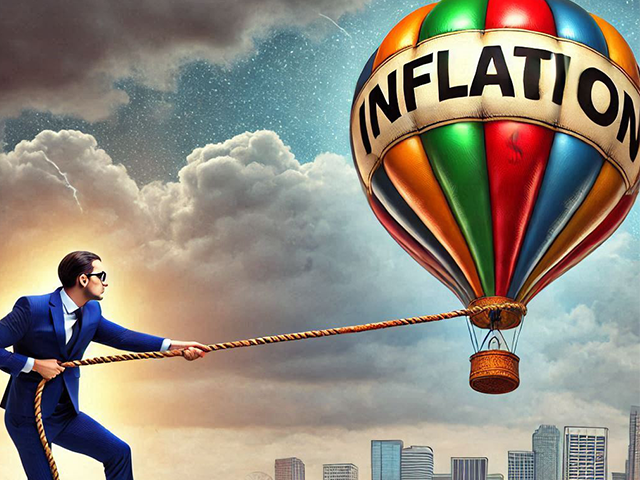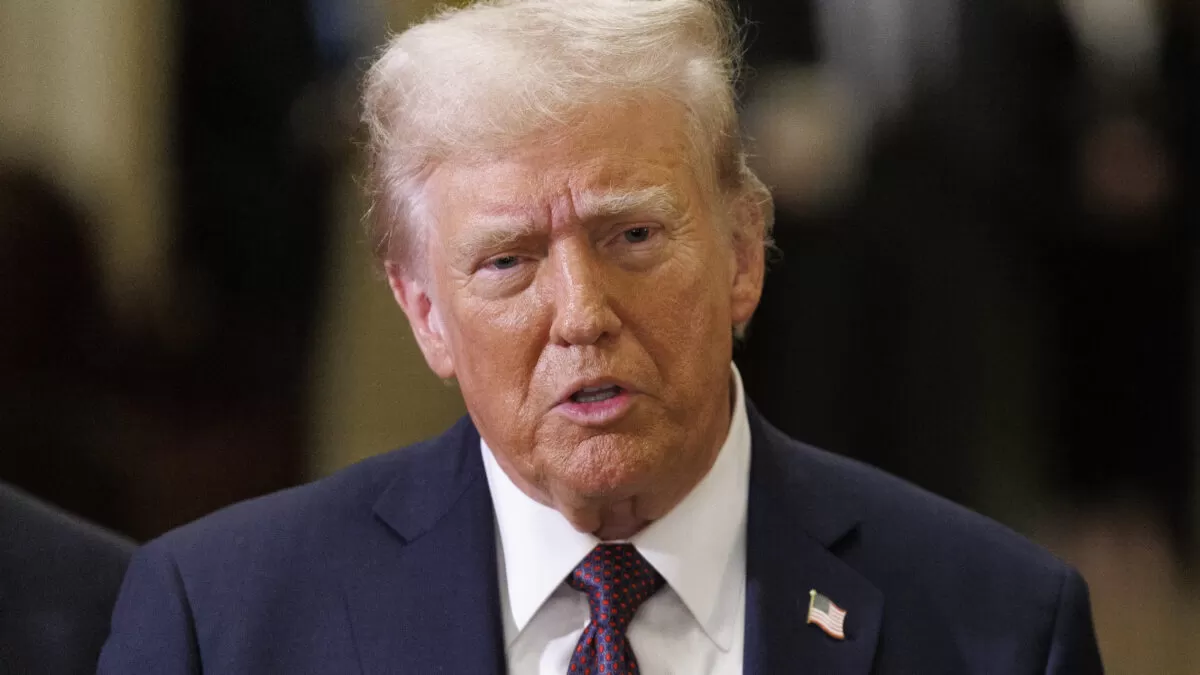from Bloomberg Opinion
Bidenflation’s Ghost Will Keep Haunting the American Economy
by John Carney
Breitbart.com
 Trump Inherits Biden’s Costly Economic Legacy
Trump Inherits Biden’s Costly Economic Legacy
America may be just about done with Joe Biden, but the malevolent economic legacy of his presidency is not done with us.
The latest economic data indicate that Donald Trump will inherit an economy where inflation has become entrenched at a high level, the manufacturing sector is moribund, trade imbalances persist, fiscal deficits remain at unsustainable levels, and consumers view the economy as seriously unhealthy.
This week’s consumer price index (CPI) report showed that inflation accelerated on a year-over-year basis, rising to 2.9 percent in December from 2.7 percent in November, and, on a month-to-month basis, climbing 0.4 percent after rising 0.3 percent in the prior month. While the bond and stock markets were relieved that core inflation came in softer than expected, inflation in the areas that squeeze household budgets hardest—food, energy, and housing—was still very hot. As the saying goes, there’s not much inflation if you exclude the necessities.
Was I Wrong About Inflation and Bonds? Did they Just Start Falling in Sync?
by David Haggith
GoldSeek
 With the Dow rallying 700 points for its best surge since November 6, the day after Election Day, and with bond yields getting sharply jerked back down—all due to the CPI inflation report—you’d think it was stellar news. In the headlines, it was, at least, a little bit good, but only a little. Core inflation, which the Fed watches most, dialed back one notch. That’s not much, but it sent the Dow up 700 notches! After a few months of going the wrong way, markets breathed a huge sigh that one measure of inflation had finally reversed direction.
With the Dow rallying 700 points for its best surge since November 6, the day after Election Day, and with bond yields getting sharply jerked back down—all due to the CPI inflation report—you’d think it was stellar news. In the headlines, it was, at least, a little bit good, but only a little. Core inflation, which the Fed watches most, dialed back one notch. That’s not much, but it sent the Dow up 700 notches! After a few months of going the wrong way, markets breathed a huge sigh that one measure of inflation had finally reversed direction.
Dig a little deeper than the headlines that were written for markets, however, and the news was a little worse than it had been. Markets that have felt like they were being throttled by inflation for the last couple of months were ecstatic over any relief they could get, so they took the good and ignored the bad.
Progress On Bringing Down Inflation Has Stalled
by John Carney
Breitbart.com
 Irrational Exuberance Over a Soft-ish Inflation Report
Irrational Exuberance Over a Soft-ish Inflation Report
The market appeared to take Wednesday’s report on inflation as an all-clear signal, triggering a rally in bonds and stocks as investors began to recover hope in future rate cuts.
The Department of Labor said the consumer price index (CPI) rose 0.4 percent in December compared with November and is up 2.9 percent compared with a year ago. While that was slightly hotter than expected, core CPI came in cooler than expected, rising just 0.2 percent month-over-month. That lowered the year-over-year rate to 3.2 percent from 3.3 percent, slightly better than what was expected.
That was the softest reading for core CPI since July. Analysts had penciled in a 0.3 percent increase, which would have been unchanged since the previous month. Note, however, that the unrounded month-over-month figure of 0.23 percent was just a smidge away from rounding up to the expected figure. Still, the decline represents a significant move in the right direction for core inflation.
Inflation Report Shows Upsurge Days Before Trump Takes Office
Prices rose 2.9% in December compared to a year ago.
by Max Zahn
ABC News
 Consumer prices rose 2.9% in December compared to a year ago, ticking up from the previous month and extending a resurgent bout of inflation just days before President-elect Donald Trump takes office. The reading matched economists’ expectations.
Consumer prices rose 2.9% in December compared to a year ago, ticking up from the previous month and extending a resurgent bout of inflation just days before President-elect Donald Trump takes office. The reading matched economists’ expectations.
The fresh data arrives after a jobs report last week showed stronger-than-expected hiring in December, which sent the stock market plummeting and bond yields soaring on fears that the Federal Reserve may delay long-forecasted interest rate cuts.
The Fed may find additional reason to delay those interest rate cuts in Wednesday’s report, since stubborn price hikes may raise concern that inflation would move even higher if interest rates were to be lowered.
Beneath the Skin of CPI Inflation: YoY CPI +2.9%, Worst Since July, MoM CPI +0.39% (+4.8% Annualized), Worst Since February. Core CPI Stuck for 7th Month at 3.1%-3.3%
by Wolf Richter
Wolf Street
 Categories that helped power the cooling of CPI are U-Turning – used & new vehicles, food, energy – just as housing seems to be coming in line.
Categories that helped power the cooling of CPI are U-Turning – used & new vehicles, food, energy – just as housing seems to be coming in line.
The overall Consumer Price Index rose by 0.39% (+4.8% annualized) in December from November, the sharpest increase since February 2024. It has been accelerating since the low point in June (blue).
The three-month CPI, which irons out some of the month-to-month squiggles. jumped by 3.9% annualized, the sharpest increase since April, and the fifth month-to-month acceleration in a row.
The year-over-year CPI rose by 2.89%, the sharpest increase since July, and the third month in a row of acceleration.
Inflation Ticked Up to 2.9% in December as Expected – Highest Since July
Inflation in December was its highest since the summer, according to data released Wednesday morning, a sign of the lingering presence of higher prices for consumers, though economists did predict an inflation bump was due.
by Derek Saul
Forbes
![]() Key Facts
Key Facts
– Headline inflation was 2.9% in December, according to year-over-year changes in the Bureau of Labor Statistics’ consumer price index, the most commonly cited measure of inflation, while the index rose 0.4% from November to December on a seasonally adjusted basis.
– Consensus economist forecasts called for 2.9% annual inflation and 0.3% month-over-month inflation, according to Dow Jones data.
– That’s the highest annual inflation reading since July’s 2.9%.
– Core inflation, which excludes the more erratic food and energy categories, was 3.2% last month, actually better than estimates of 3.3%, where it stood from September to November, though it’s still well above the 2% long-term target held by the Federal Reserve.
Wall Street Surges as Inflation Data, Bank Earnings Fuel Rally
by Chuck Mikolajczak
Reuters.com
 NEW YORK, Jan 15 (Reuters) – U.S. stocks surged on Wednesday, with all three major indexes registering their biggest daily percentage gains in more than two months, as lower-than-expected December core inflation data and solid earnings from major U.S. banks fueled a rally.
NEW YORK, Jan 15 (Reuters) – U.S. stocks surged on Wednesday, with all three major indexes registering their biggest daily percentage gains in more than two months, as lower-than-expected December core inflation data and solid earnings from major U.S. banks fueled a rally.
The Labor Department said the consumer price index (CPI) increased the most in nine months as energy costs rose, although a measure of underlying inflation pressures subsided.
Data on Tuesday showed the producer price index (PPI) rose less than expected.
“We’ve gotten so puckered over the fact that rates might be going up and this is going to be a problem and the UK won’t be able to borrow money and oh, our deficit, and so everyone was kind of wound up,” said Stephen Massocca, senior vice president at Wedbush Securities in San Francisco.
Trump’s Inauguration Won’t Change the Fact That People Dislike High Gas Prices
The incoming administration is grappling with uncomfortable political consequences of the tariffs Trump wants to impose.
by Eric Boehm
Reason.com
 After a meeting with President-elect Donald Trump at Mar-a-Lago, Alberta Premier Danielle Smith told reporters that she does not expect Canadian goods to gain any special exemptions from the tariffs Trump plans to levy soon after taking office.
After a meeting with President-elect Donald Trump at Mar-a-Lago, Alberta Premier Danielle Smith told reporters that she does not expect Canadian goods to gain any special exemptions from the tariffs Trump plans to levy soon after taking office.
Smith had pitched Trump on exempting Alberta’s crude oil exports from the 25 percent across-the-board tariffs that the incoming president has threatened to impose, the Edmonton Journal reported. Alas, Trump seems unmoved. “I haven’t seen any indication in any of the president’s public commentary or even in the comments that he had with me that he’s inclined to change his approach,” Smith told the paper.
On the American side of the border, it might be helpful for someone to game this out. More than 50 percent of the crude oil imported to the U.S.—the stuff that is used to make gasoline and other essential products—comes from Canada (and much of that total comes from Alberta, specifically).
Record High Prices in Coffee, Cocoa & Cattle as Oil Spikes and Travel Boom Continues
from King World News
 We have recently seen record high prices in coffee, cocoa and cattle as the price of oil also spikes and the travel boom continues. Take a look…
We have recently seen record high prices in coffee, cocoa and cattle as the price of oil also spikes and the travel boom continues. Take a look…
Massive Spike In Oil Prices
January 14 (King World News) – Peter Boockvar: Many of the world’s refiners, particularly those in China and India, that were previous to last week able to buy Russian oil are now scrambling to buy it from elsewhere after the newly implemented sanctions on the Russian energy space, particularly the ships that transport its oil. In response, the price of oil continues higher by almost $2 for both brent and WTI to a level last seen in July last year.
Dollar Treads Water Ahead of CPI, Tariffs Remain in Focus
by Laura Matthews
Reuters.com
 Jan 14 (Reuters) – The dollar weakened against the euro on Tuesday but stayed near its highest level in more than two years as cooler-than-expected inflation data following last week’s strong jobs report made it hard to project the Federal Reserve’s next moves on interest rates.
Jan 14 (Reuters) – The dollar weakened against the euro on Tuesday but stayed near its highest level in more than two years as cooler-than-expected inflation data following last week’s strong jobs report made it hard to project the Federal Reserve’s next moves on interest rates.
Data showed U.S. producer prices increased moderately in December. Investors had already started to scale back bets on rate cuts as potential U.S. tariffs remained in the spotlight.
The greenback pared gains later in the session as traders cautiously awaited Wednesday’s consumer price index report. Investors have been closely watching economic data to see if it supports the Fed’s cautious stance on rates.
“It’s possible that traders are hedging the other side of the market now before CPI tomorrow, so we’re seeing some pre-release volatility that’s keeping the dollar a touch depressed,” said Helen Given, associate director of trading at Monex USA in Washington. “Tariff stories are the primary driver, it appears, for price action today.”
